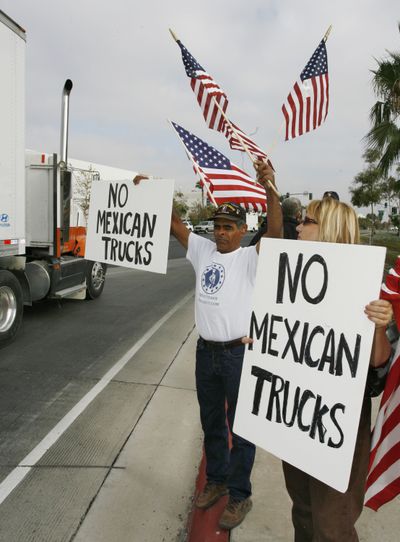Potato growers warn of trade dispute fallout
Group says clash could spoil Mexican market

WASHINGTON – The long-simmering dispute over allowing Mexican trucks onto U.S. highways is escalating into a trade war that could cost Washington state agricultural interests millions of dollars in lost sales and present the Obama administration and the Democratic-controlled Congress with an early test of their trade policies.
Washington’s pear, cherry, apricot and Christmas tree growers find themselves in the middle of a trade clash not of their own making and facing 20 percent tariffs on their exports to Mexico.
The biggest impact, however, could be on the state’s potato growers and processors. Mexico buys $83 million worth of frozen potato products annually, the bulk of them from Washington state, where 10 plants employing 20,000 people produce frozen French fries, hash browns and Tater Tots.
On the other side, organized labor, led by the International Brotherhood of Teamsters, and consumer groups insist Mexican trucks and their drivers present a major road hazard to U.S. motorists.
As the most trade-dependent state in the nation, with one in three jobs tied to exports and imports, Washington state is closely watching the Mexican trucking dispute.
“It’s a huge problem,” said Rep. Adam Smith, D-Wash., who heads a new trade working group involving moderate Democrats. “We don’t need a trade war in the middle of a recession.”
President Barack Obama will make his first trip to Mexico in mid-April. While his meetings with Mexican President Felipe Calderon are expected to focus on drug-related violence along the border, the trade dispute likely will come up.
The White House also has asked the Department of Transportation, the office of the U.S. Trade Representative and the State Department to work with Congress and Mexican officials to defuse the situation. Some have suggested new Commerce Secretary Gary Locke, a former Washington governor, also could become involved.
The dispute dates to 1995, when the United States refused to allow Mexican trucks across the border as required under NAFTA. The trade agreement, which also includes Canada, allowed for cross-border truck traffic, but U.S. officials said Mexican trucks and their drivers were unsafe.
Rather than allowing Mexican trucks free access to U.S. roads and highways, a pilot program was launched that allowed a limited number of trucks into the United States while safety issues were resolved.
Earlier this month, in approving a $410 billion spending bill, Congress killed the pilot program. Within days, Mexico retaliated by imposing tariffs on nearly 90 U.S.-produced goods worth about $2.4 billion.
The tariffs covered such products as cherries, pears, apricots, frozen potatoes, Christmas trees, strawberries, onions, fresh grapes, pet food, books, pet food, toothpaste and dishwashers.
Mexican Economic Minister Gerardo Ruiz Mateos said Congress’ decision to eliminate the pilot program was “wrong, protectionist and clearly in violation of the treaty.”
Sen. Patty Murray, D-Wash., chair of the Senate transportation appropriations subcommittee, is no stranger to the issue. As far back as 2001, Murray helped broker a compromise approved by Congress that sought to impose stricter safeguards on Mexican trucks entering the United States.
Murray said she has spoken with Transportation Secretary Ray LaHood and told him the administration must come up with a plan that will “pass muster” before more jobs or trade are lost to foreign competitors.
Meanwhile, growers in Washington state are increasingly uneasy.
The region’s pear, cherry and apricot growers could lose an estimated $6.1 million if the Mexican tariffs remain in place.
Losses to the potato industry are harder to pin down, but Mexico is the United States’ second largest market for frozen potatoes, and the 20 percent tariff could add $8 million overall to the cost of U.S. products.
Most of the competition comes from Canada. The U.S. edge – because it is closer to Mexico and transportation costs are lower – would disappear because of the tariffs, said Matt Harris, director of trade for the Washington Potato Commission.
“If this is not rectified we will lose that market,” Harris said.